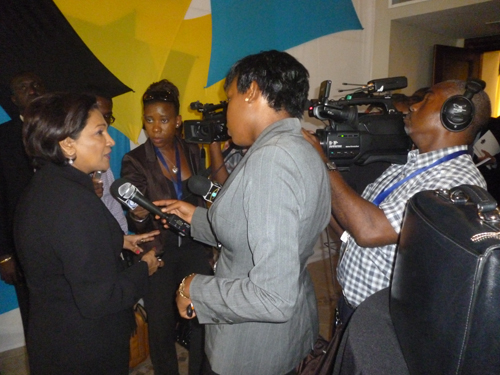All eyes on Xi in run-up to LAC visit
- By Earl Bousquet
 0 Comment(s)
0 Comment(s) Print
Print E-mail China.org.cn, May 28, 2013
E-mail China.org.cn, May 28, 2013
 |
Trinidad & Tobago Prime Minister Kamla Persad-Bissessar (L) is getting ready to host visiting China President Xi Jinping at the end of this month. [Photo: Earl Bousquet] |
President Xi Jinping's first official visit to Latin America and the Caribbean (LAC) as China's new head of state is not his first to this part of the world. But his upcoming visit to Costa Rica, Mexico and Trinidad & Tobago – all three with shores washed by the Caribbean Sea – continues the trend of his predecessors and is similarly breeding both anxiety and expectation across the wider LAC region.
China's friendly relations with the LAC region have been growing significantly stronger in the past ten years. In the five years between 2004 and 2009, then President Hu Jintao visited the region four times. Then, in 2012, President Hu and Premier Wen Jiabao, the country's top two leaders at the time, both visited the region. Similarly, more than two dozen top LAC leaders have visited China in the past decade and China-LAC trade has also multiplied over the same period.
President Xi's visit comes at an important time for both China and the LAC region, and even more so for the English-speaking Caribbean Community (CARICOM) region, of which Trinidad & Tobago is a very important member.
It's the first visit to Trinidad & Tobago by a Chinese president and China's Foreign Ministry spokesman Hong Lei stressed in Beijing that the entire trip aims "to further increase political trust and consolidate friendship and cooperation with the entire region." But it is also very important event for the host country and its other English-speaking CARICOM member-states, all of which are dwarfed in size, population and economy by their comparatively colossal Latin American neighbors.
President Xi will be the first Chinese leader ever to visit the twin-island republic, which has a thriving indigenous Chinese ethnic, cultural and business community and enjoys a higher level of trade with China than most of its CARICOM neighbors. The St. Augustine Campus of the University of the West Indies (UWI) is also home to a Confucius Institute, as well as a national association of persons of Chinese descent.
But, more than anything else, President Xi's upcoming visit will be another opportunity for Beijing to further underline China's continuing commitment to maintaining and strengthening ties with the CARICOM region, within the context of China's current policy of consolidating its relationship with the developing countries and regions of the world.
With China's world role deepening and spreading and the BRICS bloc also seeking to deepen South-South Cooperation globally, the LAC region is keeping its eyes on China. President Xi's first major overseas visit was to Africa – and his first visit to the LAC region precedes his first trip to Washington. Interestingly, U.S. President Barack Obama visited Mexico and Costa Rica earlier this month and China has made it clear ahead of its president's upcoming U.S. visit in June that it will have no problem "cooperating with Washington for the betterment of relations with Latin America."
President Xi's visit to Port of Spain creates different levels of expectation in the various CARICOM countries. Those such as Antigua and Barbuda, the Bahamas, Barbados, Dominica, Guyana, Jamaica and Surinam have relations with China and others including St. Lucia, St. Kitts and Nevis and St. Vincent and the Grenadines have diplomatic ties with Taiwan.
Those with ties to Beijing wait – with bated breath – for President Xi to possibly unveil a new China aid package specifically designed for the CARICOM region to buttress those announced on earlier visits by his predecessors.
Those CARICOM island-states with ties to Taipei, on the other hand, are keeping their eyes strained (and their fingers crossed) on the increasingly friendly Cross-Straits relationship between China's mainland and Taiwan.
Trinidad & Tobago is CARICOM's most robust economy and the only petroleum-based one in the English-speaking region. Its trade with China will increase as a result of the new cooperation agreements expected to be signed and announced during President Xi's visit.
But the visit also comes at a very politically testing time for the People's Partnership government of Prime Minister Kamla Persad-Bissessar and the ruling United National Congress (UNC).
The UNC and its rival People's National Movement (PNM) are heading into what's expected to be a bruising by-election battle for the National Parliament seat made vacant by the resignation of former National Security Minister Jack Warner, who is also the UNC's chairman.






Go to Forum >>0 Comment(s)